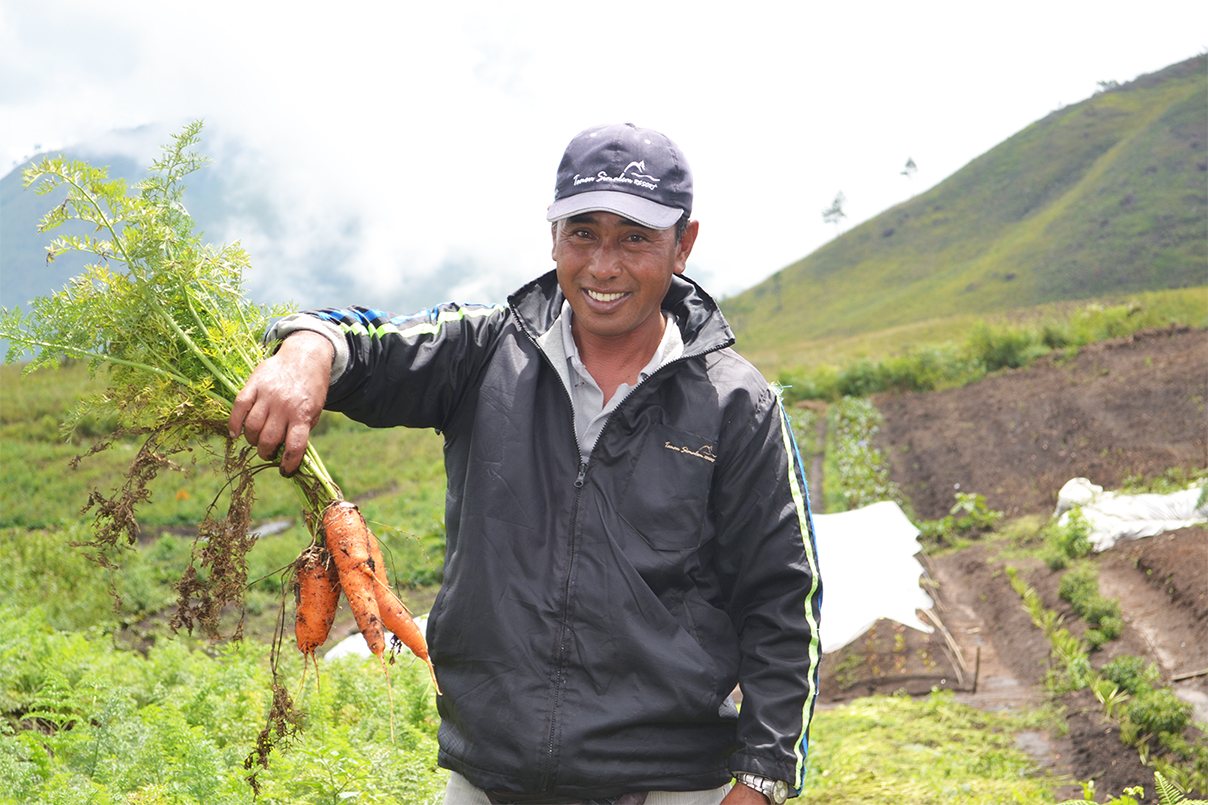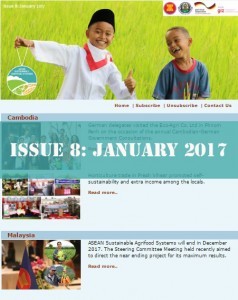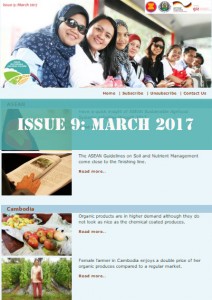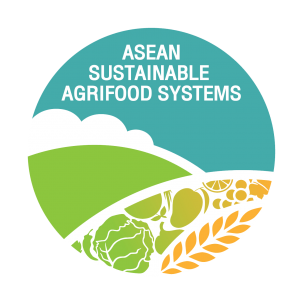ASEAN Sustainable Agrifood Systems (ASEAN SAS)

OBJECTIVE
The project aims to:
- provide solutions for long-term food security in the region through development of regionally-coordinated policies and strategies for sustainable agriculture
- promote cross-border value chains in concert with public decision-makers, agricultural enterprises as well as farmers’ and private associations
PROJECT DESCRIPTION
ASEAN Sustainable Agrifood Systems (ASEAN SAS) project is one of the two modules under the ASEAN-German Programme on Response to Climate Change: Agriculture, Forestry and Related Sectors focusing on the promotion of sustainable agricultural production. The project supports ASEAN Member States to improve the agrifood sector along entire value chains in the rice, vegetable, and fruit. This includes factors such as further processing and market linkages for small farming households. The project emphasises on biological control agents, soil and nutrient management, and farm economics.
ASEAN SAS provides technical supports in areas of:
(1) Policy framework: Development of regionally-coordinated policies, strategies and dialogue concepts for a sustainable agrifood sector.
(2) Implementation of production technologies:
Promotion of the use of sustainable inputs and crop management practices through capacity development.
(3) Market linkages: Promotion of sustainable cross-border value chains in collaboration with the private sector.
its quality. In short, the food we produce must be safe to consume.”
Mr. Ismail Iberahim, Principal Assistant Director of Plant Biosecurity Division with Malaysia’s Department of Agriculture.
“I’m happy that I can buy safe vegetables.”
Ms. Nguyen Minh Hang, Consumer, Vietnam
ASEAN SAS e-news
SUCCESS STORIES
ASEAN cooperation pushes food security and good nutrition
 Aiming at improving food and nutrition security in the region, Policy Dialogues on Food and Nutrition Security and the ASEAN Integrated Food Security (AIFS) Framework in Lao PDR, Myanmar, and Thailand were organized in 2015 to give a platform to national stakeholders including high level policy makers from concerned ministries, development partners, civil society organisations, and the private sector to discuss key challenges, issues, and roles of responsible agencies, and the contribution of the Sustainable Agrifood Systems towards food security. The three events were attended by roughly 200 participants. As result, recommendations, priority actions, and cooperation mechanisms to foster collective efforts in implementing national policies and strategies were reached.
Aiming at improving food and nutrition security in the region, Policy Dialogues on Food and Nutrition Security and the ASEAN Integrated Food Security (AIFS) Framework in Lao PDR, Myanmar, and Thailand were organized in 2015 to give a platform to national stakeholders including high level policy makers from concerned ministries, development partners, civil society organisations, and the private sector to discuss key challenges, issues, and roles of responsible agencies, and the contribution of the Sustainable Agrifood Systems towards food security. The three events were attended by roughly 200 participants. As result, recommendations, priority actions, and cooperation mechanisms to foster collective efforts in implementing national policies and strategies were reached.
Besides contributing to food and nutrition security, trainings on food and nutrition security for regional practitioners and government officers in Lao PDR and Thailand from line Ministries and Departments were also conducted in 2015 to raise awareness and understating on food and nutrition security and strengthen capacity of the personnel at regional and national levels in developing and implementing effective policies and strategies addressing food and nutrition security. About sixty participants altogether attended the three trainings.
Mr. Cheattho Prak, a Deputy Director-General of General Directorate of Agriculture, Ministry of Agriculture, Forestry and Fisheries in Cambodia said before attending the regional food and nutrition security training in March 2015, he initially only concerned about producing sufficient food to meet the demands of the country when talking about food and nutrition security.
“I am now better aware that food security is also about having a sustained variety of nutritious and safe food. For example, children know about the kind of food they should eat, how to select and cook and eat properly,” he said.
ASEAN SAS has implemented pilot projects with public and private sectors to select successful crop protection and pest management models through the use of Biological Control Agents (BCA) and Pest Integrated Management that sustain the livelihoods and competiveness of local agriculture for the future development of regionally-coordinated and national policy and strategy recommendations.
Indonesia, for example, ASEAN SAS has partnered with the agro-tourism Taman Simalem Resort (Tsr) together with the Islamic University of North Sumatra in providing knowledge and skills to local farmers in the use of bio-inputs, and giving certification support for organic production. About 70 farmers adopted organic practices and received ‘Organik Indonesia’ certification. Income of organic farmers was increased by 180 percent for growing organic fruits and vegetables since the establishment of partnership.
Ersemina Munthe, 51, farmer from Treasure of Farmers Group – 
Organik Indah Lestari said:
“We have yields increased and earn higher income because we changed from traditional farming with chemical inputs to organic practices. And, we have farming contract with Tsr which provides us the support needed for organic farming and also receive our produces at a guaranteed price.”
PUBLICATIONS
- Organic Farm Cycle and the Agriculture Value Chain
- Our Farmers Our Heroes
- Fruit Fly Control Management Strategy in North Sumatra
- Biocontrol Using Trichoderma
- ASEAN Integrated Food Security (AIFS) Framework and Strategic Plan of Action on Food Security in the ASEAN Region (SPA-FS) 2015-2020
- The Empowerment of Farmer’s Communities for Sustainable Eco-friendly Practices on Growing Horticultural Crops
COUNTRY
Thailand , Multinational Cooperation
DURATION
Jan 2014 - Dec 2019
Commission Agency
BMZ




